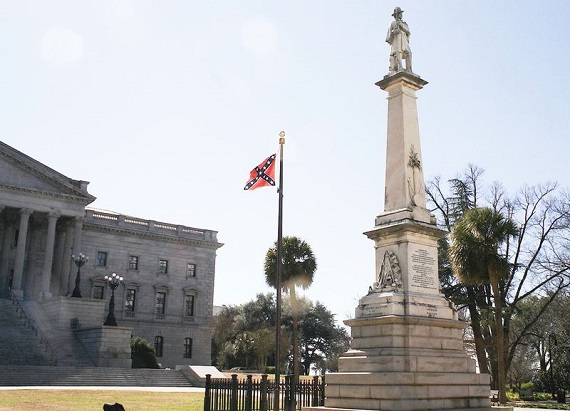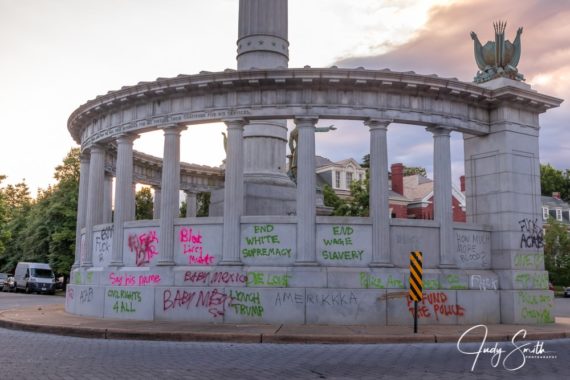Presented at the SC Sons of Confederate Veterans’
Confederate Memorial Day Commemoration
South Carolina Statehouse, Columbia, South Carolina
03 May 2014
It is my high honour and distinct privilege to be addressing you on this day and at this place; honouring the memory of our fathers at the Confederate soldiers’ monument—with its sentinel ever vigilant, eyes northward—flanked by the flag under which our sires fought.
It is a historical flag at a historically significant monument.
Anyone who is still confused about the meaning of this display is either ignorant, dishonest, or is willing to use falsehoods to further a political or social agenda. For some reason they believe their lives will be improved if the memory of our fathers and their struggle for independence is effaced from the earth. For some reason they have come to believe the worst of us, their neighbours, who harbour no ill will towards them.
It would take far more, however, than the removal of these memorials to efface the memory of our fathers and our affection for them. Unlike those who believe these symbols represent hatred, an unnatural attachment to the past, or are the by-product of some kind of mental deficiency they have called a “Confederacy of the Mind,” they most assuredly are not.
It is not our minds that are Confederate, it is our hearts, our blood, and our bones that is Confederate although, sadly, there remain few who are willing to openly say so anymore. I am, however, neither ashamed nor afraid of who and what I am.
In this present tense, ideological world in which we live, it is easy to lose sight of this simple fact: that the men whom we memorialize today are not abstractions, ideas, or political brickbats; they are not flags, monuments, or songs—they are our fathers; quite literally our fathers.
They were real men who faced real difficulties; men who reacted to their situation to the best of their ability and did so with honour and dignity. Their actions were motivated by sound principle and a deep and abiding love for their country—a country that was not merely defined by government, territorial integrity, or abstract propositions. Theirs was a real and tangible country; a country of kith and kin, blood and soil, headstones and homesteads—things worth defending, things worth dying for.
As their children, we have ample reason to be proud, indeed, to celebrate, commemorate, and memorialize our sires. Not only them, but our Confederate mothers as well who sacrificed just as much, if not more in many cases, than did our fathers.
The Biblical injunction is clear: “Honour thy father and thy mother: that thy days may be long upon the land which the LORD thy God giveth thee.” (Exodus 20:12)
The monuments raised to honour and remember our Confederate fathers that bespeckle the Southland, found in just about every Southern city, town, village, or hamlet, not only honour them, but (I believe) were purposefully erected to serve a far more important end—to preserve their history of their struggle.
It is easy to rewrite history books, but not so easy to remove granite monuments.
The loss of their history was a very real concern, especially after military defeat and a decade of military occupation.
As early as January of 1864, General Patrick Cleburne, warned what would surely come to pass should the South fail to gain her independence:
…the history of this heroic struggle will be written by the enemy; that our youth will be trained by Northern schoolteachers; will learn from Northern school books their version of the war; will be impressed by the influences of history and education to regard our gallant dead as traitors, and our maimed veterans as fit objects for derision…
History has proven these words to be prophetic. Only now it is not just Northern books and teachers, it is Southern ones as well that view our fathers (and their fathers in many cases) thusly.
Our very presence at this service today is widely viewed with suspicion and curiosity at best, but mostly as an offensive and odious act—an act of violence against the sensibilities of certain people who believe that any reminder of our family somehow disrespects the memory of theirs.
We deny this, without equivocation, and proclaim to all the world that we have a right to exist—that we have a right to be who and what we are—and we also say, as respectfully as we possibly can, that we will not stand by and be insulted and castigated; that we will not allow the memory of our fathers to be treated so carelessly, and, most assuredly, we will do all in our power to resist and, if need be, fight the cultural genocide that has been declared against our people—both living and dead.
We have not only a right to exist, but more importantly an obligation to exist and to pass on to those generations who follow the truth about their fathers and, thus, the truth about themselves.
General Robert E. Lee once said that “A nation [or people] which does not remember what it was yesterday does not know where it is today.”
How can we possibly know where we are if cannot or will not remember where we came from?
How can future generation know where they are if we fail to preserve the memory of our common past?
But there is more: We also need to know where we are going. Plotting a course without a starting point is destined for failure.
Edmund Burke, speaking in the 1780’s, wisely observed that
Society is an open-ended partnership between generations. The dead and the unborn are as much members of society as the living. To dishonour the dead is to reject the relation on which society is built—a relation of obligation between generations. Those who have lost respect for the dead have ceased to be trustees of their inheritance. Inevitably, therefore, they lose their sense of obligation to future generations. The web of obligation shrinks to the present tense.
We are now living in a society, indeed, a world, that views itself in the present tense—with no roots whatsoever—completely separated from historical context. In this condition they run headlong into the future, deaf, dumb, and blind.
As this country continues to stagnate economically, as the few liberties we currently enjoy are under constant threat, as the social underpinnings that once connected family, faith, and community buckle under the weight of the constant assault of popular culture and public policy, we stand here today and point to this monument, this flag, and the men and women of the Confederate era—our very own mothers and fathers—as shining examples of who we are and what we can and must be.
These memorials we make and have been made to serve as a reminder to not only us, but to the world at large, that there once existed a people willing to stand up and say “No more!” To sacrifice all for the sake of what was then, and remains today, true and eternal.
Remembering our fathers, knowing where we came from, and knowing where we are is a necessary precondition if we wish to steer the Titanic on which we are travelling away from the proverbial iceberg.
By honouring and remembering our fathers, reclaiming their history—our history—we place ourselves in a position to take, just as they did, the long view.
Grasping hands through the generations—one reaching back to our fathers and the other reaching forward to our children, we occupy the causal position that they once held.
The dead can only teach and advise by their charter, conduct, and the effects of these that linger. Future generations will inherit, for better or for worse, what we leave behind.
By memorializing our fathers, we realize that the call that they answered now rings in our ears— for the memory of our fathers, for the inheritance of our children, for the sake of duty itself.
Next to our obligation to God, we have no higher duty than to our families—those who have passed, those who are with us now, and those that will follow us. To our shame, we have allowed those who would insult and denigrate the good name and character of our fathers to dictate the terms and language of their so-called “defence,” as if they need one. We have nothing of which to be ashamed, nothing that needs defending. If anyone needs defending, it is those who hold that the invasion of these sovereign states in 1861 was anything more than an illegal and unjustified act of aggression. We must find the courage to follow their brave and principled example and never apologise for who and what they were and who and what we are.
Every people has a story and we have ours. Be proud!
It is our birth-right, our inheritance, and, as such, it is our most solemn duty to hold it sacred.
God save the South!







